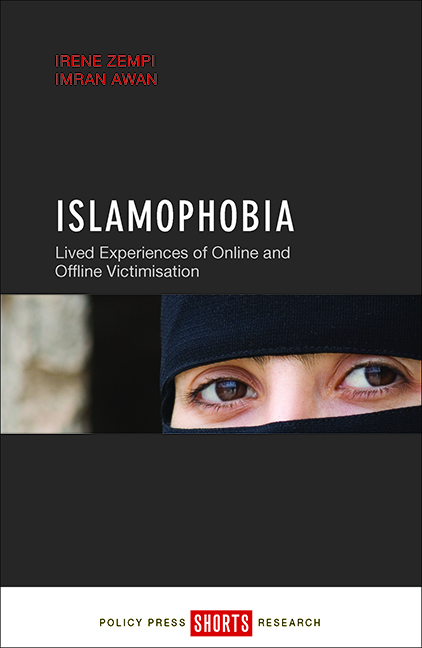Book contents
two - Research methods
Published online by Cambridge University Press: 05 April 2022
Summary
This chapter presents the methodology of this study and the rationale for using in-depth interviews when researching Islamophobia. It highlights the core epistemological and methodological assumptions that characterise qualitative research. Also, it discusses the practicalities of the present methodology, including developing the interview guide, establishing rapport and trust with participants, and analysing the research data using the principles of grounded theory. This is followed by a discussion of reflexivity, which outlines how the researchers’ positionality and subjectivity might have influenced the research process.
Overview of research design
The research took the form of a qualitative study based on individual, in-depth interviews with Muslim men and women between May and August 2015. Specifically, we interviewed 20 individuals who had been victims of both online and offline Islamophobia in the UK. Participation to the study was voluntary. The interviews, undertaken by the authors, typically ranged from one to two hours, with an average interview length of one hour. All interviews were digitally recorded, transcribed verbatim and then analysed using grounded theory. The research aims and objectives of the study were: (a) to examine the nature and extent of online and offline Islamophobia directed towards Muslims in the UK; (b) to understand the factors that determine the prevalence and severity of online and offline Islamophobia; (c) to explore the impact of this hostility upon victims, their families and wider Muslim communities; (d) to offer recommendations in terms of preventing and responding to both online and offline Islamophobia.
The study employed purposive sampling, which is a non-random method of participant recruitment. Prospective participants were Muslims who had reported their online and offline experiences of Islamophobia to Tell MAMA. Launched in 2012, the Tell MAMA programme is a non-profit organisation that is coordinated and implemented by an interfaith organisation, Faith Matters. Tell MAMA offers services to individuals who have suffered Islamophobic attacks. It operates as an alternative reporting system on the basis that if victims want the attack logged and passed on to the police (but they do not wish to contact the police themselves), Tell MAMA will do this on their behalf. Individuals can report to Tell MAMA in various ways including via a Freephone number, SMS, Facebook, Twitter, e-mail and online. Tell MAMA contributes to supplementing official statistics through a variety of reporting mechanisms, including the use of social networking sites.
- Type
- Chapter
- Information
- IslamophobiaLived Experiences of Online and Offline Victimisation, pp. 15 - 24Publisher: Bristol University PressPrint publication year: 2016



